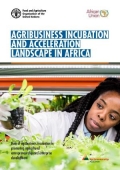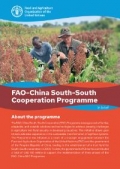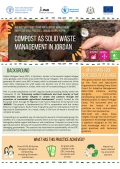文件

South-south Cooperation
24 Apr 2024
This report aims at providing an overview of the agribusiness incubation and acceleration landscape in Africa. The study is a joint effort between the Food and Agriculture Organization of the United Nations (FAO), the African Union Commission (AUC) and the Agripreneurship Alliance. The study mapped and analysed over 430 enterprise support organizations (ESOs) from across the continent.
Civil Society
19 Mar 2024
Partnerships are core to FAO’s strategy to achieve its objectives, and as part of this work, FAO has significantly strengthened its connections with Civil Society Organizations (CSOs) over the past few years. Since the launch of the FAO Strategic Framework 2022-31, which calls for transformative partnerships to contribute to achieving the Sustainable Development Goals (SDGs), FAO is pursuing strategic engagement with CSOs, capitalizing on their breadth and diversity of expertise and characteristics, necessary to transforming agrifood systems and overcoming complex global challenges.
FAO seeks close collaboration with CSOs...
South-south Cooperation
22 Jan 2024
The FAO-China South-South Cooperation (SSC) Programme leverages cost-effective, adaptable, and scalable solutions and technologies to address pressing challenges in agriculture and food security in developing countries. This initiative draws upon China’s extensive experience in the sustainable transformation of agrifood systems.
The Programme was initiated as a result of a strategic engagement between the Food and Agriculture Organization of the United Nations (FAO) and the government....jpg)
South-south Cooperation
17 Jan 2024
非洲的发展受到2019冠状病毒病(COVID-19)、气候危机和乌克兰战争的三 重影响,面临巨大挑战。消除饥饿的进展出现倒退,全球极端贫困率20年来首次上升。目前亟需创新,并采取多元化的合作方式。南南合作及三方合作正是这样一种解决方案。联合国粮食及农业组织(粮农组织)在与全球南方伙伴开展农业发展合作方面拥有40多年经验。非洲从合作机遇中获益良多。尤其是撒哈拉以南非洲地区,粮农组织近80%的南南合作及三方合作都是在该地区开展的。凭借如此丰富的经验,粮农组织为非洲各地社区带来了积极影响。本数字出版物详细介绍了粮农组织在非洲开展南南合作及三方合作的方式,探讨了最近的案例,并勾画了未来的道路。
South-south Cooperation
01 Dec 2023
Zaatari Refugee Camp (ZRC), in Northern Jordan, is the seventh-largest refugee camp globally, and it hosts around 80 000 Syrian refugees. This new population generates 34 metric tons (MT) of waste, which is collected and trucked out of the camp daily. Disposing the solid waste has become one of the most serious environmental problems in Jordan, with much of its waste ending up in landfill.
